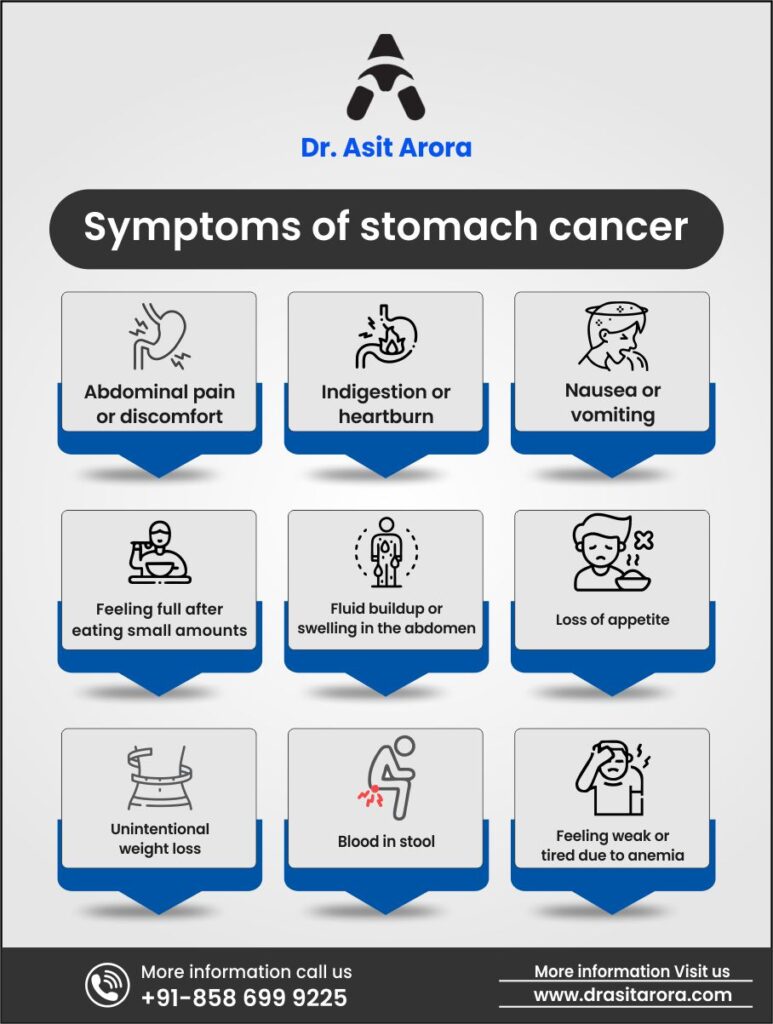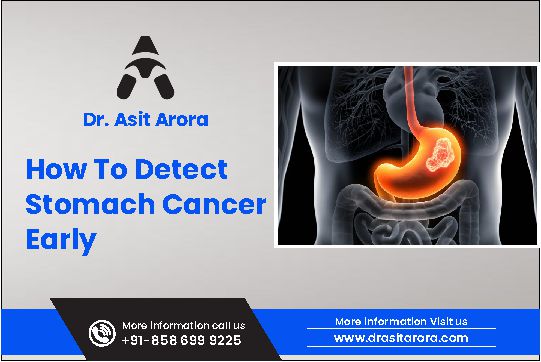Overview
Stomach or gastric cancer is a severe condition that develops in the stomach lining. It is one of the most common cancers worldwide. Early detection of stomach cancer is essential, as it can increase the chances of successful treatment and better outcomes. In this article, we’ll discuss the symptoms of stomach cancer and how it can be diagnosed.

Early Signs of Stomach Cancer
Unlike some cancers, which show dramatic warning signs, stomach cancer often begins with what we often ignore- called discomfort. These include:
- Constant indigestion or acidity – It is not the occasional reflux, it’s a repeated burning or discomfort that doesn’t improve with usual remedies.
- Feeling of fullness very quickly – It is known as early satiety, and even small meals can cause uncomfortable heaviness in the stomach.
- Mild, unexplained nausea – It’s a nagging sick feeling without any food poisoning or infection.
- Frequent bloating or burping – In cases, when it feels different from your usual pattern.
- Subtle loss of appetite – No desire to have food without any other explanation.
These symptoms may seem minor, but the key is persistence. If they continue for weeks even after routine treatment, they should never be ignored.
Symptoms of stomach cancer
Stomach cancer can be challenging to detect in the early stages because symptoms may not appear until the cancer has advanced. However, some signs and symptoms can indicate the presence of stomach cancer. Here are some common symptoms of stomach cancer:
- Abdominal pain or discomfort
- Indigestion or heartburn
- Nausea or vomiting
- Feeling full after eating small amounts
- Fluid buildup or swelling in the abdomen
- Loss of appetite
- Unintentional weight loss
- Black coloured stool or Malena
- Feeling weak or tired due to anemia (less red blood cells)
Some of these symptoms may also be caused by conditions other than stomach cancer, such as an ulcer or a viral fever. If you experience any of these symptoms, especially if they persist for over a few weeks, it is crucial to see a doctor for further evaluation. Early detection and treatment of stomach cancer can improve your chances of a successful outcome.
Diagnosis of stomach cancer
Here are some ways to detect stomach cancer early:
Physical examination
A physical examination can also help detect stomach cancer early. During a physical exam, a healthcare provider may feel for any lumps or abnormalities in the stomach area and check for any signs of anemia, a symptom of stomach cancer. A physical exam can help identify potential signs of stomach cancer and may lead to further diagnostic testing.
Endoscopy and Biopsy
A biopsy for stomach cancer involves taking a small sample of tissue from the stomach lining to check for the presence of cancer cells. This procedure is usually done during an endoscopy. A thin tube with a camera and a small cutting tool is inserted through the mouth and down the throat into the stomach.
During the biopsy, the doctor will use the cutting tool to take a small tissue sample from the stomach lining. The sample is then sent to a laboratory for analysis by a pathologist, who will examine it under a microscope for any signs of cancer cells. It can also help doctors determine the best course of treatment for the patient.
Blood tests
Blood tests alone cannot diagnose stomach cancer. However, they can be used with other diagnostic tools to help detect and monitor the disease.
A complete blood count (CBC) is a blood test that measures the levels of different types of blood cells, including red blood cells, white blood cells, and platelets. Abnormal levels may indicate the presence of stomach cancer. However, CBC results can also be affected by other factors, such as infections or other medical conditions.
Tumor markers are substances produced by cancer cells or the body in response to cancer. The tumor marker that is most commonly used for stomach cancer is carcinoembryonic antigen CEA. Elevated levels of these markers in the blood may indicate the presence of stomach cancer. However, they can also be elevated in other conditions or even in healthy individuals.
Imaging tests
Imaging tests are commonly used to diagnose and monitor stomach cancer. One of the most common imaging tests is a plain abdomen x-ray, which can help detect abnormalities, such as tumors or blockages in the stomach or other organs.
Computed tomography (CT) scans are frequently used to diagnose stomach cancer. A CT scan uses X-rays and computer technology to create detailed images of the inside of the body. It can help identify the size and location of a tumor, as well as any nearby lymph nodes that may be affected.
Magnetic resonance imaging (MRI) is another imaging test that can be used to diagnose and monitor stomach cancer. An MRI uses powerful magnets and radio waves to create detailed images of the inside of the body. It can be beneficial for detecting tumors in soft tissues, such as the stomach lining.
Positron emission tomography (PET) scans are sometimes used to diagnose and stage stomach cancer. During a PET scan, a small amount of radioactive material is injected into the body. A special camera creates images of the radioactive material as it moves through the body. This can help identify areas of cancerous activity in the body.
Endoscopic ultrasound (EUS) is a procedure that combines endoscopy with ultrasound technology to create images of the stomach and surrounding areas. A small ultrasound probe is attached to the end of an endoscope and inserted through the mouth and throat into the stomach. EUS can help identify a tumor’s depth and any nearby lymph nodes that may be affected.
Screening Tests
Regular screening tests include endoscopy, which involves using a thin, flexible tube with a camera to examine the inside of the stomach.
Though done routinely in countries like Japan and Korea, it is not recommended for general cancer screening in India.
Only high risk patients or who have symptoms are offered this.
Screening for stomach cancer in average-risk people
In some countries, routine screening tests for stomach cancer are not recommended for people with average risk. This is mainly because the condition is uncommon in these countries, reducing the likelihood that the advantages of screening would outweigh any potential risks (including requiring additional procedures or tests, even in some individuals who might not develop stomach cancer).
As stomach cancer is not routinely screened in these countries, most patients are not diagnosed unless they exhibit certain symptoms and signs that require medical tests.
Mass population screening has helped detect many stomach cancers at an early, perhaps more treatable stage in some Asian countries where stomach cancer is substantially more prevalent. It’s unclear whether this has resulted in fewer deaths from stomach cancer.
Screening for stomach cancer in high-risk people
The advantages of screening may outweigh the risks in some individuals at higher risk for stomach cancer due to certain risk factors (For instance, certain stomach disorders may mark the onset of cancer or genetic diseases like familial adenomatous polyposis [FAP] or Lynch syndrome). For example, these people may benefit from regular upper endoscopy.
If you have risk factors for stomach cancer, consult a physician about the benefits and disadvantages of stomach cancer screening.
Risk Factors: Who Should Be More Alert?
Stomach cancer does not affect everyone in the same way. Some individuals naturally have more risk due to their medical conditions, lifestyle, or genetics. Let’s break it down.
1. Health and Medical Conditions
Some risks come directly from the body’s own health conditions and infections.
- H. pylori infection – A common stomach infection that can lead to ulcers. Long-term infection increases the risk and long-term damage
- Chronic gastritis or polyps – Frequent irritation of the stomach lining can increase your risk.
- Pernicious anaemia – A rare condition that is linked with B12 deficiency and changes in stomach functions.
- Previous gastric surgery – It can sometimes make your stomach more vulnerable.
2. Genetic and Family History
If someone in your close family had stomach cancer, it itself increases your risk.
- Some genetic mutations, like the CDH1 gene, which is linked with Hereditary Diffuse Gastric Cancer, can cause cancer at a young age — may be even in your 30s or 40s.
3. Lifestyle Factors
Your daily habits and food choices affect how much stress the stomach lining goes through.
- Smoking & alcohol – Both damage the lining of the stomach. Smokers have nearly double risk.
- Diet high in salt, pickles, and processed meats – Common in Indian households, but high in cancer-causing substances.
- Obesity – Especially belly fat, which puts extra pressure on the stomach.
4. Environment & Work Exposure
Long-term exposure to coal, rubber, or industrial dust (like in mining or chemical factories) can increase risk.
5. Age and Gender
Stomach cancer is not equally distributed—it becomes more common with age and shows a clear difference between men and women.
- After age 60, the risk of stomach cancer rises sharply.
- Men are almost twice as likely to get stomach cancer as women.
Understanding the Stages of Stomach Cancer
Doctors divide stomach cancer into stages based on how far the cancer has spread. Here’s how you can think about it:
- Stage I – Cancer is still in the inner lining. Best time for treatment. High survival rate.
- Stage II – It spreads deeper into the muscle layer or nearby lymph nodes.
- Stage III – Cancer covers most of the stomach wall and involves several lymph nodes.
- Stage IV – Cancer has spread to other organs (like liver, lungs, etc.).
Why this matters: If you catch it in Stage I, chances of survival are over 70%. But in Stage IV, it drops to less than 10%. That’s a big reason why early detection is everything.
Why choose Dr. Asit Arora?
When it comes to stomach cancer, Dr. Asit Arora is a top choice for patients seeking expert care. He currently serves as the Director and head of the GI & HPB Oncology Division at Max Super Speciality Hospital Saket, and Max Smart. Dr. Arora is widely recognised as one of the best doctors for stomach cancer surgery in Delhi and across India.
His expertise includes HPB cancer surgery, advanced laparoscopic surgery, and gastrointestinal oncosurgery. In recognition of his outstanding contributions to the field of cancer care, he was awarded the prestigious title of Oncosurgeon of the Year at the 2022 ET Healthcare Awards.
Dr. Arora is committed to providing the best possible care to his patients, using the latest techniques and technologies to ensure the best possible outcomes. His compassionate and patient-centered approach ensures that his patients feel supported and informed throughout their journey with cancer. Choosing Dr. Asit Arora means choosing expert, compassionate care for stomach cancer.
FAQ`s About Stomach Cancer
Q. Why is Early Awareness of stomach cancer crucial?
Ans: Most stomach cancers are diagnosed late because people assume symptoms are “just acidity” or “just age”. But repeated or unexplained digestive changes deserve medical attention. An endoscopy with biopsy remains the most reliable way to confirm or rule out cancer.
Q. Is Stomach Cancer common in Women?
Ans: Stomach cancer is more common in men, but women can also get it. Their symptoms may appear slightly different and are sometimes misread by doctors as stress or normal stomach issues.





[…] […]
[…] buy viagra kenya […]
[…] clomid for sale […]
[…] cancer, is often diagnosed at advanced stages due to its subtle and nonspecific early symptoms. Early detection of stomach cancer is critical for effective treatment, yet it remains a challenge. Dr. Asit Arora and his team […]
[…] Recognizing stomach cancer symptoms early plays a crucial role in effective treatment. Unfortunately, many of the symptoms in the early stages can be vague or mistaken for less serious conditions. Common early signs include persistent indigestion, bloating after meals, a feeling of fullness after eating small amounts of food, heartburn, and mild nausea. As the disease progresses, more alarming symptoms may appear, such as unexplained weight loss, vomiting (sometimes with blood), blood in the stool, fatigue, and difficulty swallowing. If any of these stomach cancer symptoms persist for more than a few weeks, it is important to consult a healthcare provider promptly. […]
[…] tests for cancer markers offer vital clues for early detection, monitoring treatment response, and checking for recurrence. This guide explains what tumor markers […]
[…] mexican viagra 100mg […]
[…] how much is cialis […]
[…] viagra sildenafil 50mg tablets […]
[…] no presciption cialis […]
[…] ginseng root morning routine for men […]
[…] sildenafil 75 mg […]
[…] viagra sildenafil 50mg tablets […]
[…] cialis 5mg price […]
[…] discount cialis […]
[…] buy viagra 50mg online […]